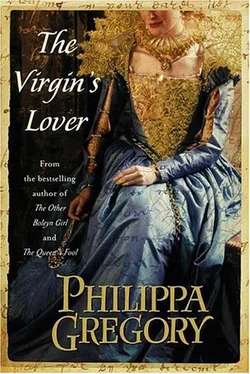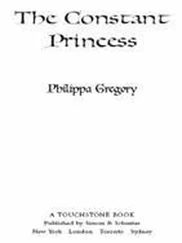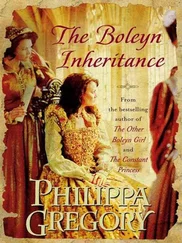The ambassador was not to be diverted. Not even Elizabeth, with all her charm deployed, could bring a smile to his face. Finally he rose from his seat, pleading ill health.
“See the trouble you have caused?” Norfolk said sharply to Dudley.
“I?”
“Baron von Breuner thinks my cousin the queen unlikely to marry while she is openly in love with another man, and has advised the archduke not to come to England yet.”
“I am the queen’s loyal friend, as you know,” Dudley said disdainfully. “And I want nothing but what is best for her.”
“You are a damned aspiring dog,” Norfolk swore at him. “And you have stood in her light so that no prince in Europe will have her. D’you think they don’t hear the gossip? D’you think that they don’t know that you are all over her like the Sweat? D’you think they believe that you and she have called it off now? Everyone thinks that you have just stepped back for her to pick her cuckold, and no man of honor will have her.”
“You insult her; I will see you for it,” Dudley said, white with anger.
“I may insult her, but you have ruined her,” Norfolk threw back at him.
“Because some archduke won’t come to pay court?” Dudley demanded. “You are neither a true friend nor a true Englishman if you think she should marry a foreigner. Why should we have another foreign prince on the English throne? What good did Philip of Spain do us?”
“Because she must be married,” Norfolk said in a heat of rage. “And to royal blood, at any rate to a better man than a dog like you.”
“Gentlemen.” The cool tones of Sir Francis made them turn. “Noblemen indeed. The queen is looking your way; you are breaking up the pleasant harmony of the feast.”
“Tell him,” Norfolk said, pushing past Dudley. “I am beyond listening to this nonsense while my kinswoman is ruined and the country sinks without allies.”
Robert let him go. Despite himself he glanced at the throne. Elizabeth was looking toward him. The ambassador had left and in her concern for what her uncle was saying to the man she loved, she had not noticed even his farewell bow.
The Scots Protestants’ letter, duly travel-stained and authentically rewritten, came to the queen’s hand at the end of November. Cecil brought it to her and laid it on her desk as she was prowling around the room, unable to concentrate on anything.
“Are you ill?” he asked, looking at the pallor of her skin and her restlessness.
“Unhappy,” Elizabeth said shortly.
That damned Dudley, he thought to himself, and moved the letter a little closer so that she would open it.
She read it slowly.
“This gives you cause to send an army to Scotland,” Cecil said to her. “This is an appeal by the united lords of Scotland for your help in resisting a usurping power: the French. No one can say you are invading for your own ends. No one can say that you are overthrowing a legitimate queen. This is your invitation from the legitimate lords, citing their justifiable grievances. You can say ‘yes.’”
“No,” she said nervously. “Not yet.”
“We have sent funds,” Cecil enumerated. “We have sent observers. We know that the Scots lords will fight well. We even know that they can defeat Mary of Guise; they threw her back right to the very shore of the sea at Leith. We know that the French will come, but they have not yet set sail. They are waiting for the weather to change. Only the wind stands between us and invasion. Only the very air stands between us and disaster. We know this is our moment. We have to take it.”
She rose from her desk. “Cecil, half the Privy Council warn me that we are certain to lose. Lord Clinton, the High Admiral, says he cannot guarantee that our navy could hold off a French fleet; they have better ships and better guns. The Earl of Pembroke, the Marquess of Winchester advise me against going into Scotland; your own brother-in-law, Nicholas Bacon, says the risk is too great. Caspar von Breuner warns me in secret that although he and the emperor are my friends, they are certain that we will lose. The French court laughs out loud at the thought of us trying to make war against them. They find it laughable that we should even dream of it. Everyone I ask tells me that we are certain to lose.”
“We are certain to lose if we leave it too late,” Cecil said. “But I think we can possibly win if we send our army now.”
“Perhaps in the spring,” she temporized.
“In the spring the French fleet will be moored in Leith dock and the French will have garrisoned every castle in Scotland against us. You might as well send them the keys now and be done with it.”
“It is a risk, it is such a risk,” Elizabeth said miserably, turning to the window, rubbing at her fingernails in her nervousness.
“I know it. But you have to take it. You have to take the risk because the chance of winning now is greater than you will ever have later.”
“We can send more money,” she said miserably. “Gresham can borrow more money for us. But I dare not do more.”
“Take advice,” he urged her. “Let us see what the Privy Council has to say.”
“I have no advisors,” she said desolately.
Dudley again, Cecil thought. She can barely live without him. Aloud he said bracingly: “Your Grace, you have a whole council of advisors. We shall consult them tomorrow.”
But the next day, before the meeting of the Privy Council, there came a visitor from Scotland. Lord Maitland of Lethington came in disguise, authorized by the other Scots lords secretly to offer the queen the crown of Scotland if she would only support them against the French.
“So, they have despaired of Arran,” Cecil said, his joy so great that he could almost taste it on his tongue. “They want you.”
For a moment Elizabeth’s ready ambition leapt up. “Queen of France, Scotland, Wales, Ireland, and England,” she breathed. “Lands from Aberdeen to Calais. I would be one of the greatest princes in Europe, one of the richest.”
“This makes the future of the kingdom a certainty,” Cecil promised her. “Think of what England could do if joined with Scotland! We would be safe at last, and safe forever from the danger of invasion from the north. We would break the risk of invasion from the French. We could use the strength and wealth of Scotland to go onward and forward. We would become a mighty power in Christendom. Who can tell what we might achieve? The Crown of England and Scotland together would be a power in the world that would be recognized by everyone! We would be the first great Protestant kingdom that the world has ever known.”
For a moment he thought he had managed to give her his own vision of the destiny she could claim.
Then she turned her head away. “This is to entrap me,” she complained. “When the French invade Scotland I would have to fight them. They would be on my land; I could not ignore it. This would force us to fight them.”
“We will have to fight them anyway!” Cecil exclaimed at the circularity of her thinking. “But this way, if we win, you are Queen of England and Scotland!”
“But if we lose then I am beheaded as Queen of England and Scotland.”
He had to control his impatience. “Your Grace, this is an extraordinary offer from the Scots lords. This is the end of years …no…of centuries of enmity. If we win, you have united the kingdom, as your father wanted, as your grandfather dreamed. You have the chance to be the greatest monarch England has ever known. You have the chance to make a united kingdom of these islands.”
“Yes,” Elizabeth said unhappily. “But what if we lose?”
It was Christmas Eve, but the court was far from merry. Elizabeth sat very still in her chair at the head of the table, her Privy Councillors around her, her only movement the constant rubbing at the cuticles of her fingernails, buffing her nails with her fingertips.
Читать дальше
Конец ознакомительного отрывка
Купить книгу












